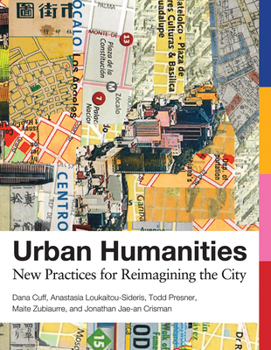Urban Humanities: New Practices for Reimagining the City
Urban humanities is an emerging field at the intersection of the humanities, urban planning, and design. It offers a new approach not only for understanding cities in a global context but for intervening in them, interpreting their histories, engaging with them in the present, and speculating about their futures. This book introduces both the theory and practice of urban humanities, tracing the evolution of the concept, presenting methods and practices with a wide range of research applications, describing changes in teaching and curricula, and offering case studies of urban humanities practices in the field.
Urban humanities views the city through a lens of spatial justice, and its inquiries are centered on the microsettings of everyday life. The book's case studies report on real-world projects in mega-cities in the Pacific Rim--Tokyo, Shanghai, Mexico City, and Los Angeles--with several projects described in detail, including playful spaces for children in car-oriented Mexico City, a commons in a Tokyo neighborhood, and a rolling story-telling box to promote "literary justice" in Los Angeles.






